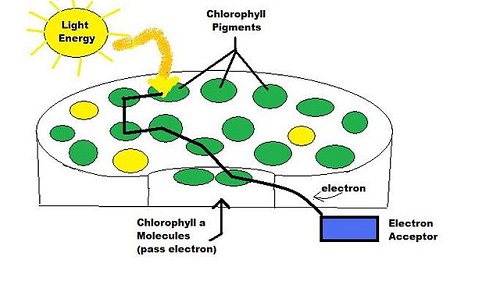What is the difference between chlorophyll and chloroplast?
Autotrophs make their food by trapping light from the sun and combine with water and carbon dioxide. The process of photosynthesis requires chlorophyll and chloroplast to take place.
The core difference between chlorophyll and chloroplast is that chlorophyll is the green pigment in green plants while chloroplast is the green structures that provide a site for photosynthetic activity.

What is a Chlorophyll?
Chlorophyll is the green photosynthetic pigment that is involved in the process of photosynthesis. It is responsible for trapping light and transferring high energy electrons to the photosystem.
Chlorophyll is the reason behind the green matter on the chloroplast. It is found in all plants, algae, and some bacteria.
What is a Chloroplast?
The chloroplast is a cell organelle where photosynthesis takes place. They have a double membrane that is semi-permeable to certain ions and molecules.
The double membrane contains stromal fluid with suspended thylakoids. The grana are the site where photosynthesis takes place.
Comparison Table: Chlorophyll Vs Chloroplast
| Basic Terms | Chlorophyll | Chloroplast |
| Meaning | It is the pigment that gives plants the green color | It is the organelle responsible for photosynthesis |
| Type | Type a and b | No types |
| Significance | It is the green pigment involved in photosynthesis | It is the organelle that provides a site for photosynthesis |
| Parts | They are part of the chloroplast | The part of plant cell |
| Pigment | It has green pigment and carotenoids which have red and yellow pigments. | Do not have any pigment |
| Presence | Inside the chloroplast | In the leaves of the plants |
| Occurrence | Plants, algae, and bacteria | All plants and algae |
| Composition | Do not contain DNA | Contain DNA |
| Structure | Consist of a central magnesium atom, tetrapyrrole ring, and a side phytol chain | Consists of the outer membrane, intercellular space, outer membrane, and specialized thylakoid membrane |
Core Difference between Chlorophyll and Chloroplast
- Chlorophyll is a plant pigment while chloroplast is a cell organelle
- Chloroplast contains DNA while chlorophyll do not contain organelles
- Chlorophyll occurs in the chloroplast while chloroplast in the plant leaves
- Chlorophyll is found in plants, algae, and bacteria while chloroplast in all plants and algae
- Chlorophyll contains central magnesium atm, tetrapyrrole ring, and phytol chain while chloroplast contain outer membrane, intercellular space, and stroma
- Chlorophyll has green pigment and carotenoids which has red and yellow pigments while chloroplast does not contain any pigment
- The chloroplast is part of the plant cell while chlorophyll is part of the chloroplast
- Chlorophyll has several types while chloroplast have no any type
- Chlorophyll is responsible for the green color of the plant while chloroplast is the site where photosynthesis takes.
- Both light and dark reaction takes place in chloroplast while chlorophyll is the pigment that traps light for photosynthesis
You May Also Like:
- Difference between Autotrophs and Heterotrophs
- Difference between Vascular and Non-Vascular Plants
- Difference between Photosystem I and Photosystem II
Comparison Video
Summary
The main difference between chloroplast and chlorophyll is that chloroplast is the organelle responsible for photosynthesis while chlorophyll is the green pigment of the plant. Both chlorophyll and chloroplast are found in plants.